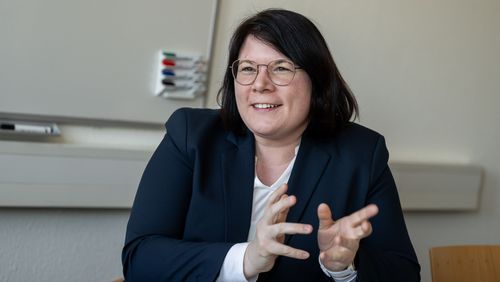Trouble finding courses for the semester abroad? International students of the social sciences and humanities who come to Oldenburg are spared this. Instead, the university offers a programme tailor-made for incomings.
The range of subjects is immense: social geography or international law, cultural and literary studies, history or gender studies, the international economic order, linguistics and language teaching. Insights into these and other fields have been offered to international exchange students at the university since 2017 by the one- to two-semester programme "European Studies in Global Perspectives", EUGL in short. It is mainly based on the regular range of elective modules in English offered by four of the university’s six Schools, namely those of Educational and Social Sciences, Computing Science, Business Administration, Economics and Law, Linguistics and Cultural Studies, and Humanities and Social Sciences. In addition, EuGl comprises a seminar on Germany as a migration society and a German language course at the university’s Language Centre as two compulsory elements.
"International students are very interested in the programme, and current and prospective partner institutions as well," says Lea Brenningmeyer, PhD student of American Studies and EuGl coordinator. "When students return home after completing the programme, the next one often follows.” She counts around 20 applications per semester. Among them have been students who subsequently even took up a Master's programme in Oldenburg: "They used the programme to get a taste of studying here, while making intensive use of the university's counselling services and getting to know and love Oldenburg.”
Student Claire McLaughlin would certainly like to take at least a second semester in the EuGl programme after the recently completed summer semester: "I really loved that the programme includes both international and German perspectives on most topics," says the 21-year-old, who studies German and International Studies at California State University in Long Beach (USA). "I met a lot of Germans through the programme, so I can imagine it would be a good way to make friends for other people, too".
In “normal” times maybe even more. The summer semester turned digital at short notice due to the corona pandemic. "We are currently receiving many inquiries due to the current circumstances, for example about the proportion of classroom teaching," says Lea Brenningmeyer. Some students have withdrawn their applications, while others plan to complete a digital exchange semester. This winter semester, EuGl is offering the possibility of both presence and online courses – a hybrid semester. "In the personal consultation, we make sure that we put together the right seminars for everyone," says the coordinator.
Brenningmeyer sees the one-to-one advice - in addition to that provided by the International Office - as a major plus of the study programme. "Many students who have studied abroad have had the experience of painstakingly selecting their courses," she says, "When, for example, students of International Relations come to Oldenburg, they are caught between two stools - in this case between the respective schools comprising the Institute for Social Sciences and the Department of Economics.” This is where EuGl comes in as a sort of “bridge” between the different institutes, departments and schools, offering advice that helps them put together a tailor-made timetable from the subject cluster "Society, Economy, and Politics" – or alternatively "Languages, Cultures, and Education".
An additional bonus is the EuGl certificate, which confirms the successful completion of one or two semesters. At the same time, in the sense of “internationalisation at home”, she considers the programme an asset to Oldenburg students who can broaden their intercultural skills in contact with the incomings.
Three years after the start, Brenningmeyer is currently refining the programme, hand in hand with the schools’ internationalisation representatives. When expanding the module catalogue, they can draw on the English-language courses offered by the schools. "These come with a European Studies reference, of course", she points out. If new modules are added, this is always done in consultation with the respective teaching staff. For the third time, Brenningmeyer is offering a seminar in this context herself and in which, under the heading "Screening Europe", she and the students will examine the representations of Europe in US-American film and television.
Although many of the courses are held in English, US exchange student McLaughlin also was able to put her knowledge of German to use. This spring, she was the only non-native speaker who attended "Transnational Perspectives in Gender Studies" which was taught both in English and German with lecturers who participated via video-chat from Germany, India and South Africa. “In addition, there were readings in both German and English, so it is good if you want to practice your German skills.” Her conclusion: "EuGl fits in almost exactly with my degree programme at home.”




